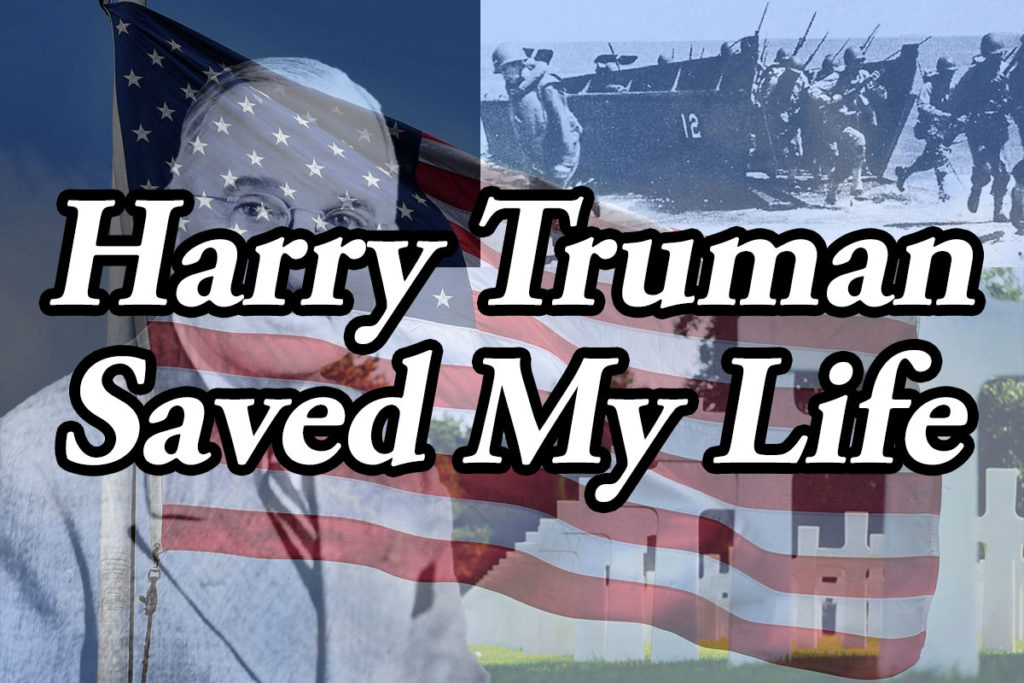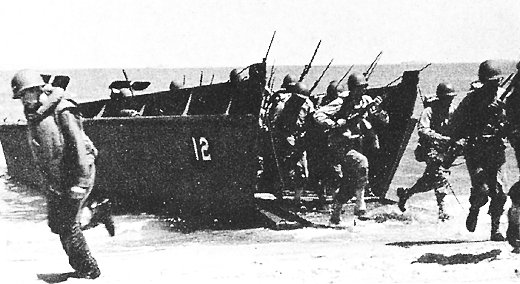Share This Short Story
Vacationing in New Orleans back in June 2000, we discovered the newly opened D-Day Museum, an extensive series of exhibits dedicated to the landings of the Allied Forces on the Beaches of Normandy. Through a series of expansions, connections to the Smithsonian, and designation by Congress, the facility is now known as the National World War II Museum.
When we first spotted the museum, I questioned why New Orleans. The answer is simple – the Higgins Boat. Based on the swamp boats common to Louisiana, Andrew Higgins designed and manufactured over 20,000 boats for the military through his company, Higgins Industries based in New Orleans.
While you may not recognize the name, you will recognize a picture of the boat which Dwight Eisenhower considered crucial to the Allies’ victory.
The officially named LCVP (landing craft, vehicle, personnel) was a wide, flat bottom boat open at the top with a landing door across its bow – perfect for transporting vehicles and large number of men through the shallow surf and onto the beach. The opening sequence of the movie Saving Private Ryan, which premiered just two years before our visit to New Orleans, featured the boats and highlighted their drawbacks – an unsteadiness in the water that caused seasickness, plywood sides that were useless in defense against bullets, and, when the steel bow ramp was dropped on the beach, the exposure that the men on the ship had to the gun defenses of the Nazi Army. But the boats’ speed in dropping resources on the beach and returning to waiting ships for more men and supplies made them invaluable in a beach assault.
Standing in the museum, I studied the replica Higgins boat on exhibit and tried to imagine 36 men crawling down nets from a Navy transport boat into a space so small they had to stand. Touching the plywood walls, I envisioned being tossed in rough seas and fighting sea sickness while hearing the battle rage above the surf. Studying the steel bow, I pictured it dropping into the water and men rushing out into a hail of flying bullets. Trying to comprehend the feeling of the men who rode the boats to the Normandy beaches (and other beaches throughout the war), I remarked aloud how scared they must have been.
A shaky voice answered, “It’s impossible to describe how scared we were.”
I turned to the elderly gentleman sitting in a wheelchair at my side. His job on June 6 1944, he said, was the same as the other 35 men sharing the Higgins boat with him – to live long enough to get to the rocky cliffs in front of them of Omaha Beach and remove the German Army defenses. He said it so matter of factly, so succinctly, that he made it sound simple. But the reality was that many on his boat failed to reach those cliffs.
Fifty-six years after D-Day, I listened to the tales of this man who was all of 18 when he ran across that beach. He described the friends lost that day and in the days to come. He thought of himself as lucky – someone who came home, built a life, and lived through the years – thankful that he wasn’t one of those who didn’t return. And intent on keeping their memory alive.
He didn’t think of himself as a hero. He just remembered that scared kid running across the sand.
What did he do after that day, I asked. “Walked across Europe” was his answer, a gross simplification of the horror of the months to come. Just another man among many who did his job. And came home to a new life.
A little over a decade later, I was sitting in a local restaurant while an elderly couple enjoyed their dinner at the table next to us, just an ordinary dinner out during their vacation. Their meal finished, the gentleman attempted to stand. Observing that he was having some difficulty, I stood and offered my arm as support. As he leaned against me to rise to his feet, his wife commented that he, at 89, was having some challenges. Glad to be of assistance, I said, having helped my own father through some infirmities and difficulty in standing.
Thanking me for my help, he added the phrase, “Harry Truman saved my life.”
“Sir?”
“I was on a troop transport ship in the Pacific when he dropped the bomb. Without his decision, I wouldn’t be here today.”
Left unsaid was the horror unlived of invading Japan, stepping off a Higgins boat and battling his way up the shore. Untold thousands of allied soldiers would have died in such an attempt, possibly including the man in front of me.
Instead, decades later, he enjoyed a quiet dinner with his wife. A dinner with your spouse seems so ordinary, so common, so matter of fact. And, yet, he was grateful to have had the opportunity of that dinner and so many before it.
He, like the man in New Orleans, simply felt lucky that he had been given a chance to live a full life.
On November 11, we observe Veterans Day here in the U.S. – an opportunity for all of us to pause and thank those who have served in the Armed Forces. On Memorial Day, we remember those who lost their lives while serving in the military, but Veterans Day is to celebrate everyone who served – ordinary men and women who put on that uniform and did extraordinary things.
They may not think of their experiences as extraordinary. These two men certainly did not, though one invaded Europe and the other was headed to invade Japan. They weren’t generals or celebrated leaders. They were simply men who did what their country asked. And then they came home and lived quiet lives raising families, happy to be among the living and remembering their brothers who didn’t come home.
As we approach Veterans Day, I want to repeat what I said to each of them. It seems like such a small thing to say, but I meant it then and I mean it now. And I mean it wholeheartedly to everyone who has ever worn the uniform.
Thank you for your service.
Image credits for the title photograph:
Cemetery in Colleville-sur-Mer, France is courtesy of Erik-Jan Leusink via Unsplash
Harry Truman is courtesy of the Library of Congress
American flag is courtesy of Danne from Pexels
Higgins Boat courtesy of the United States Government archives
Subscribe to the Random Musings
Want to be sure never to miss a Musing? Subscribers will be notified when I post a random observations on life or a short story. The email is absolutely FREE and you my unsubscribe at any time.



What a poignant story. My dad was a WWII veteran but he never spoke about it. I will fly my flag Saturday and attend a local celebration and wish he were there with me. Thank you for the reminder.
Thank you for this beautiful tribute to our Veterans. I had four uncles in WWII, one in the Navy, the other three in the Army – including one in the Army air Corps. We were lucky and they all came home.